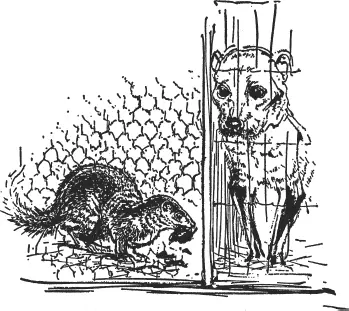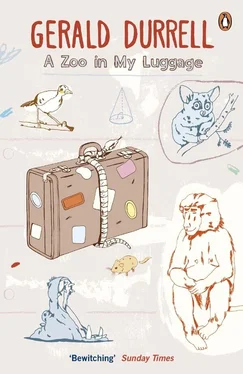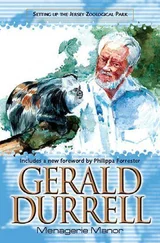Gerald Durrell - A Zoo in My Luggage
Здесь есть возможность читать онлайн «Gerald Durrell - A Zoo in My Luggage» весь текст электронной книги совершенно бесплатно (целиком полную версию без сокращений). В некоторых случаях можно слушать аудио, скачать через торрент в формате fb2 и присутствует краткое содержание. Жанр: Природа и животные, на английском языке. Описание произведения, (предисловие) а так же отзывы посетителей доступны на портале библиотеки ЛибКат.
- Название:A Zoo in My Luggage
- Автор:
- Жанр:
- Год:неизвестен
- ISBN:нет данных
- Рейтинг книги:4 / 5. Голосов: 1
-
Избранное:Добавить в избранное
- Отзывы:
-
Ваша оценка:
- 80
- 1
- 2
- 3
- 4
- 5
A Zoo in My Luggage: краткое содержание, описание и аннотация
Предлагаем к чтению аннотацию, описание, краткое содержание или предисловие (зависит от того, что написал сам автор книги «A Zoo in My Luggage»). Если вы не нашли необходимую информацию о книге — напишите в комментариях, мы постараемся отыскать её.
A Zoo in My Luggage — читать онлайн бесплатно полную книгу (весь текст) целиком
Ниже представлен текст книги, разбитый по страницам. Система сохранения места последней прочитанной страницы, позволяет с удобством читать онлайн бесплатно книгу «A Zoo in My Luggage», без необходимости каждый раз заново искать на чём Вы остановились. Поставьте закладку, и сможете в любой момент перейти на страницу, на которой закончили чтение.
Интервал:
Закладка:

After dinner we armed ourselves with a bottle of whisky and an abundant supply of cigarettes and, taking our pressure lamp, we set off for the Fon’s house. The air was warm and drowsy, full of the scents of wood smoke and sun-baked earth. Crickets tinkled and trilled in the grass verges of the road and in the gloomy fruit-trees around the Fon’s great courtyard we could hear the fruit bats honking and flapping their wings among the branches. In the courtyard a group of the Fon’s children were standing in a circle clapping their hands and chanting in some sort of game, and away through the trees in the distance a small drum throbbed like an irregular heart beat. We made our way through the maze of wives’ huts, each lit by the red glow of a cooking fire, each heavy with the smell of roasting yams, frying plantain, stewing meat or the sharp, pungent reek of dried salt fish. We came presently to the Fon’s villa and he was waiting on the steps to greet us, looming large in the gloom, his robe swishing as he shook our hands.
‘Welcome, welcome,’ he said, beaming, ‘come, we go for inside.’
‘I done bring some whisky for make our heart happy,’ I said, flourishing the bottle as we entered the house.
‘Wah! Good, good,’ said the Fon, chuckling. ‘Dis whisky na foine ting for make man happy.’
He was wearing a wonderful scarlet and yellow robe that glowed like a tiger skin in the soft lamplight, and one slender wrist carried a thick, beautifully carved ivory bracelet. We sat down and waited in silence while the solemn ritual of the pouring of the first drink was observed. Then, when each of us was clutching half a tumblerful of neat whisky, the Fon turned to us, giving his wide, mischievous grin.
‘Chirri- ho !’ he said, raising his glass, ‘tonight we go have happy time.’ And so began what we were to refer to later as The Evening of the Hangover.
As the level in the whisky bottle fell the Fon told us once again about his trip to Nigeria, how hot it had been and how much he had ‘shweated’. His praise for the Queen knew no bounds, for, as he pointed out, here was he in his own country feeling the heat and yet the Queen could do twice the amount of work and still manage to look cool and charming. I found his lavish and perfectly genuine praise rather extraordinary, for the Fon belonged to a society where women are considered to be nothing more than rather useful beasts of burden.
‘You like musica?’ inquired the Fon of Jacquie, when the subject of the Nigerian tour was exhausted.
‘Yes,’ said Jacquie, ‘I like it very much.’
The Fon beamed at her.
‘You remember dis my musica?’ he asked me.
‘Yes, I remember. You get musica time no dere, my friend.’
The Fon gave a prolonged crow of amusement.
‘You done write about dis my musica inside dis your book, eh?’
‘Yes, that’s right.’
‘And,’ said the Fon, coming to the point, ‘you done write about dis dancing an’ dis happy time we done have, eh?’
‘Yes … all dis dance we done do na fine one.’
‘You like we go show dis your wife what kind of dance we get here for Bafut?’ he inquired, pointing a long forefinger at me.
‘Yes, I like too much.’
‘Foine, foine … come, we go for dancing house,’ he said, rising to his feet majestically, and stifling a belch with one slender hand. Two of his wives, who had been sitting quietly in the background, rushed forward and seized the tray of drinks and scuttled ahead of us, as the Fon led us out of his house and across the compound towards his dancing house.
The dancing house was a great, square building, not unlike the average village hall, but with an earth floor and very few and very small windows. At one end of the building stood a line of wickerwork arm-chairs, which constituted a sort of Royal enclosure, and on the wall above these were framed photographs of various members of the Royal family. As we entered the dancing hall the assembled wives, about forty or fifty of them, uttered the usual greeting, a strange, shrill ululation, caused by yelling loudly and clapping their hands rapidly over their mouths at the same time. The noise was deafening. All the petty councillors there in their brilliant robes clapped their hands as well, and thus added to the general racket. Nearly deafened by this greeting, Jacquie and I were installed in two chairs, one on each side of the Fon, the table of drinks was placed in front of us, and the Fon, leaning back in his chair, surveyed us both with a wide and happy grin.
‘Now we go have happy time,’ he said, and leaning forward poured out half a tumblerful of Scotch each from the depths of a virgin bottle that had just been broached.
‘Chirri-ho,’ said the Fon.
‘Chin-chin,’ I said absent-mindedly.
‘Na whatee dat?’ inquired the Fon with interest.
‘What?’ I asked, puzzled.
‘Dis ting you say.’
‘Oh, you mean chin-chin?’
‘Yes, yes, dis one.’
‘It’s something you say when you drink.’
‘Na same same for Chirri-ho?’ asked the Fon, intrigued.
‘Yes, na same same.’
He sat silent for a moment, his lips moving, obviously comparing the respective merits of the two toasts. Then he raised his glass again.
‘Shin-shin,’ said the Fon.
‘Chirri-ho!’ I responded, and the Fon lay back in his chair and went off into a paroxysm of mirth.
By now the band had arrived. It was composed of four youths and two of the Fon’s wives and the instruments consisted of three drums, two flutes and a calabash filled with dried maize that gave off a pleasant rustling noise similar to a marimba. They got themselves organized in the corner of the dancing house, and then gave a few experimental rolls on the drums, watching the Fon expectantly. The Fon, having recovered from the joke, barked out an imperious order and two of his wives placed a small table in the centre of the dance floor and put a pressure lamp on it. The drums gave another expectant roll.
‘My friend,’ said the Fon, ‘you remember when you done come for Bafut before you done teach me European dance, eh?’
‘Yes,’ I said, ‘I remember.’
This referred to one of the Fon’s parties when, having partaken liberally of the Fon’s hospitality, I had proceeded to show him, his councillors and wives how to do the conga. It had been a riotous success, but in the eight years that had passed I had supposed that the Fon would have forgotten about it.
‘I go show you,’ said the Fon, his eyes gleaming. He barked out another order and about twenty of his wives shuffled out on to the dance floor and formed a circle round the table, each one holding firmly to the waist of the one in front. Then they assumed a strange, crouching position, rather like runners at the start of a race, and waited.
‘What are they going to do?’ whispered Jacquie.
I watched them with an unholy glee. ‘I do believe,’ I said dreamily, ‘That he’s been making them dance the conga ever since I left, and we’re now going to have a demonstration.’
The Fon lifted a large hand and the band launched itself with enthusiasm into a Bafut tune that had the unmistakable conga rhythm. The Fon’s wives, still in their strange crouching position, proceeded to circle round the lamp, kicking their black legs out on the sixth beat, their brows furrowed in concentration. The effect was delightful.
‘My friend,’ I said, touched by the demonstration, ‘dis na fine ting you do.’
‘Wonderful,’ agreed Jacquie enthusiastically, ‘they dance very fine.’
‘Dis na de dance you done teach me,’ explained the Fon.
Читать дальшеИнтервал:
Закладка:
Похожие книги на «A Zoo in My Luggage»
Представляем Вашему вниманию похожие книги на «A Zoo in My Luggage» списком для выбора. Мы отобрали схожую по названию и смыслу литературу в надежде предоставить читателям больше вариантов отыскать новые, интересные, ещё непрочитанные произведения.
Обсуждение, отзывы о книге «A Zoo in My Luggage» и просто собственные мнения читателей. Оставьте ваши комментарии, напишите, что Вы думаете о произведении, его смысле или главных героях. Укажите что конкретно понравилось, а что нет, и почему Вы так считаете.










